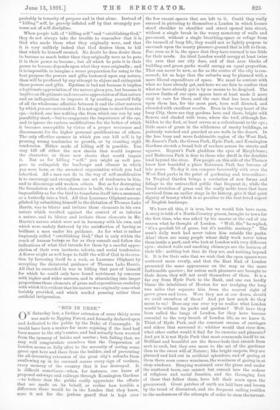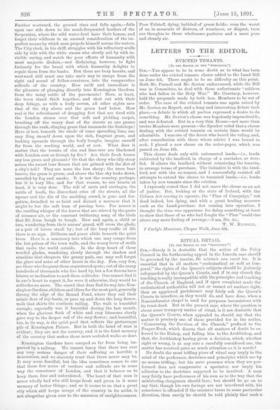"RUB IN URBE."
ON Saturday last, a further extension of some thirty acres was made to Epping Forest, and formally declared open and dedicated to the public by the Duke of Connaught. It would have been a matter for more rejoicing if the land had been nearer to the city's centre, and had actually been wrested from the tyranny of bricks and mortar ; but, failing that, we may well congratulate ourselves that the Corporation of London seems so fully alive to the necessity of saving some green spot here and there from the builder, and of preventing the all-devouring extension of the great city's suburbs from swallowing up in it's outward course every sign of verdure, every memory of the country that it has destroyed. It is difficult sometimes—when, for instance, one hears of proposed subways and railways through Kensington Gardens —to believe that the public really appreciate the efforts that are made on its behalf, or realise how terrible a difference there would be in the London that they know, were it not for the jealous guard that is kept over
the few vacant spaces that are left to it Could they really succeed in picturing to themselves a London in which *houses stood shoulder to shoulder and street opened into street, without a single break in the weary monotony of walls and pavement, without a single breathing-space or refuge from the turmoil of busy life, they would not so lightly propose to encroach upon the scanty pleasure-ground that is left to them. For, even as it is, the space that they have rescued is too little for their needs. An ideal London would occupy at least twice the area that our city does, and of that area blocks of building and green parks would occupy an equal proportion. That can never be now, as far as the centre of the city is con- cerned; let us hope that the suburbs may be planned with a more liberal expenditure of space. We must be content with what we have already got, and here we are fain to confess that what we have already got is by no means to be despised. The narrow limits of our open spaces have at least made it more easy to care for them, and the care that has been lavished upon them has, for the most part, been well directed, and attended with excellent results. Even in the very heart of the busy City, there are tiny gardens here and there, bright with flowers and shaded with trees, where the turf, although for- bidden to the foot, at least serves as a refreshment to the eye ; little oases of green in the wilderness of smoky buildings, as jealously watched and guarded as are wells in the desert. In the less busy and more fashionable region of the West End, St. James's Park, the Green Park, Hyde Park, and Kensington Gardens stretch a broad belt of verdure across its streets and squares. Regent's Park gladdens the eyes of Marylebone ; and Battersea Park is dear to those who dwell in the desolate land beyond the river. Few people on this side of the Thames know how beautiful a place Battersea Park has become of late years. To-day it can compare favourably with even the West-End parks in the point of gardening and tree-culture : its Tropical Garden brings a revelation of new forms and foliage to the untravelled public that frequent it; while the broad stretches of grass and the really noble trees that have survived from an earlier stage in its history, give it that quiet dignity of beauty which is so peculiar to the best-loved aspect of English landscape.
We have all this, it is true, but we would fain have more. A story is told of a North-Country groom, brought to town for the first time, who was asked by his master at the end of the season what he thought of London. "Well, Sir," he replied, "it's a goodish bit of grass, but it's terrible scattery." The man's daily work had never taken him outside the parks. Alas! there are many people whose daily work never takes them inside a park, and who look at London with very different eyes : stained walls and smoking chimneys are the horizon of their life : nothing but that do they see, and nothing beyond it. It is for their sake that we wish that the open spaces were scattered more evenly, and that the East End of London presented the same appearance on the map as the more fashionable quarter ; for unless such pleasures arc brought to their doors, they will not avail themselves of them. It is a far cry from Hyde Park to the Bank, and one can hardly blame the inhabitant of Hoxton for not trudging the long two miles that separate him from the nearest sight of green grass and trees. Were they not at our doors, should we avail ourselves of them P And yet how much do they mean to us ! Does any one ever try to realise what London would be without its parks and gardens P Well have they been called the lungs of London, for they have become essential to the very breath of London life, as we know it. Think of Hyde Park, and the constant stream of carriages and riders that surround it : whither would that river flow, what other outlet would it find for its exercise and pleasure P And yet it is not Hyde Park that most commends itself to us. Brilliant and beautiful are the flower-beds that stretch from arch to arch, but they owe more to the art of the gardener than to the sweet will of Nature ; like bright carpets, they are planned and, laid out in artificial splendour, and of gazing at them there soon comes weariness, the weariness of gazing in at shop-windows. Straying westward over the grass and under the scattered trees, one cannot but remark how the ardour of religious and social fanatics, and the thronging feet of those that follow them, have left their scars upon the greensward. Great patches of earth are laid bare and brown by the tread of discontent, and the frequent railing testifies to the uselessness of the attempts of order to stern the torrent.
Further westward, the ground rises and falls again,—falls upon one side down to the much-frequented borders of the Serpentine, where the wild water-fowl have their homes, and forget their wildness in an amused consideration of the im- perfect moans by which man propels himself across the waters. The City clerk, in his skiff, struggles with his refractory sculls side by side with the white swans who slowly sail by with in- visible oaring, and watch the poor efforts of humanity with most majestic disdain,—not disdaining, however, to fight furiously for the bread with which humanity delights to regale them from the banks. But these are busy haunts, and westward still must one take one's way to escape from the sight and sound of fellow-creatures, into the comparative solitude of the country. How swift and immediate is the pleasure of plunging directly into Kensington Gardens from the noisy rattle of the pavements ! Here, at least, the trees stand thick together, and shut out with their deep foliage, as with a leafy screen, all other sights save that of the sky above and the green turf below. How real is the refreshment of dragging feet that are tired with the London stones over that soft and yielding carpet, brushing off the weary dust of the streets as one passes through the rank, clinging grass that trammels the footsteps ! Here at last, beneath the shade of some spreading lime, one may fling oneself down upon the rich, fragrant grass, and looking upwards through the leafy boughs, imagine oneself far from the working world, and at rest. What does it matter that the trunks of elm and lime-tree are blackened with London soot as though by fire ? Are their fresh leaves any less green and pleasant ? Or that the sheep who idly stray across the sward bear fleeces that are grimed with the dirt of a city's toil ? They are none the less sheep; the trees bear leaves; the grass is green; and above the blue sky looks down, unveiled by fog and smoke. It is not the country, perhaps, but it is very like, and for that reason, to our hearts at least, it is very dear. The roll of carts and carriages, the rattle of hoofs, the discordant cries of the streets, all the uproar and the din of the madding crowd, is gone and for- gotten, dwindled to so faint and distant a murmur that it might be but the soft hum of passing bees. Far nearer is the rustling whisper of the leaves that are stirred by the gusts of summer air, or the constant twittering song of the birds that flit from bough to bough. Now and again, a child or two, wandering from their nurses' guard, will cross the glade, or a pair of lovers stroll by; but of the busy traffic of life there is no sign. Stillness and peace abide beneath the quiet trees. Here is a sanctuary into which one may escape from the hot prison of the town walls, and the weary fever of strife that racks the world outside. In the deep- heart of these wooded glades, wandering slowly through the shadow and sunshine that chequers the grassy path, one may well forget the glare and noise of other hours in the day. Few, very few, are those who frequent these sequestered spots; out of the many hundreds of thousands who live bard by, but a few dozens have leisure or inclination to seek these solitudes. One cannot find it in one's heart to regret it, for were it otherwise, they would be solitudes no more. The crowd that does find its way into Ken- sington Gardens, children and idlers for the most part, generally throng the edge of the Round Pond, where they sail their mimic fleet of toy-boats, or pace up and down the long flower- walk that skirts the southern railing. The walk is beautiful enough ; especially was it beautiful during the last month, when the glorious flush of white and rosy blossoms slowly gave way to the deeper red of the may-flower ; and beautiful, too, in its way, is the quiet pool that reflects the picturesque pile of Kensington Palace. But in both the hand of man is evident; they are not the country, and it is the faint memory of the country that makes these more secluded walks so dear.
Kensington Gardens have escaped so far from being im- proved by a railway. We cannot fancy that there was ever any very serious danger of their suffering so horrible a desecration, and we sincerely trust that there never may be. It may seem fanciful, but the idea sometimes comes to one that these few acres of verdure and solitude are in some way the conscience of London, and that it behoves us to keep them free and unburdened. The heart of that man is never wholly bad who still keeps fresh and green in it some memory of better things ; and so it seems to us that a great city which still keeps scraps of the country in its midst, is not altogether given over to the mammon of unrighteousnesa, Poor Falstaff, dying, babbled of green fields : even the worst of us, in moments of distress, of weariness, or disgust, turn our thoughts to those wholesome pastures and a more pure and cleanly air.



































 Previous page
Previous page